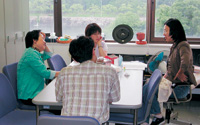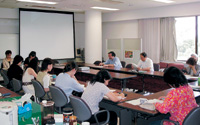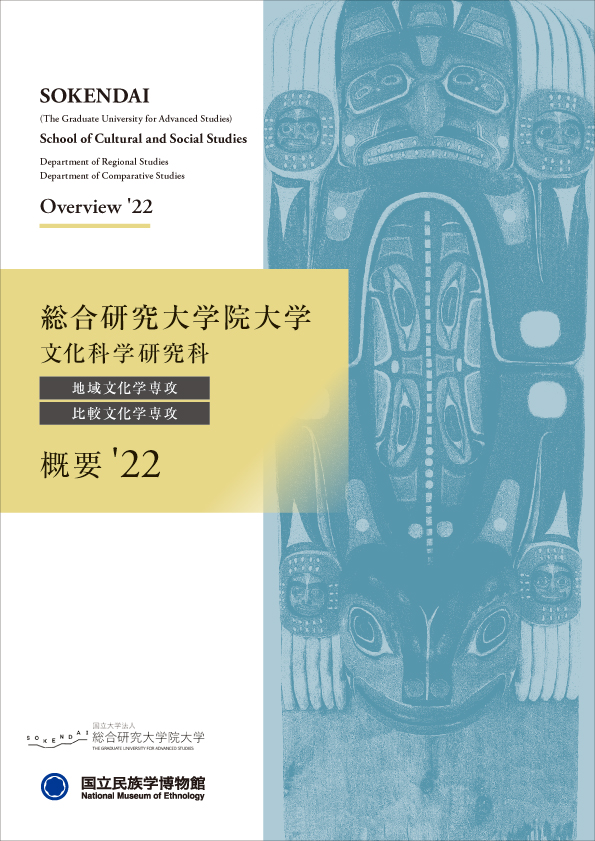Departments(Before March 2023)
The Department of Regional Studies

The graduate students’ room.
The Department studies the individual cultures of ethnic groups in Asia, Europe, Africa, the Americas, and Oceania. It considers the characteristics and history of each culture and focuses on describing a culture and understanding its structure using ethnographic methodology. The Department fosters researchers who have high expertise and actively promote the descriptive study of individual cultures based on fieldwork.
Educational Policies for the Department of Regional Studies
For students in the Department of Regional Studies, Minpaku offers a wealth of printed materials, artifacts, and video and audio recordings from many parts of the world. Since Minpaku is an Inter-University Research Institute, they also have the opportunity to participate in joint projects involving leading researchers from around the world. By taking advantage of these opportunities, they receive the training they need to conduct their own high-quality research. They will also be trained in long-term fieldwork, how to present their work at international meetings, and how to manage joint research. With their supervisors as primary research advisors, each student assembles an advisory group suitable to his or her research topic; they also receive guidance from other faculty members involved in their specialty.
The Department of Comparative Studies

A seminar in process.
The Department of Comparative Studies is designed for students interested in the comparative and cross-cultural study of social systems, religion, technology, languages, arts, and cultural resources. Through the comparative study of ethnic cultures, students are expected to identify the cross-cultural aspects of their research subjects and to develop theoretical interpretations of the comparative data. To foster researchers with high expertise, we encourage new research methods integrating relevant information technology and interdisciplinary approaches with the traditional anthropological methods.
Educational Policies for the Department of Comparative Studies
This department is based at Minpaku, Japan’s National Museum of Ethnology, an Inter-University Research Institute established to implement large-scale joint research with universities, museums, and other research institutions both in and outside of Japan. It is also an open museum, with exhibitions, talks, and seminars open to members of the general public. In addition to artifacts related to the lifeways of peoples around the globe, its resources also include video and audio recordings, in addition to written and printed materials. Students are trained in both the theory and practice of comparative research and refine their academic writing and presentation skills by writing academic papers and participating in academic meetings, developing the indispensable ability to communicate their findings to the public. Each student has an advisor group constructed to fit his or her research topic and, under the direction of his or her supervisor, receives specialized training in this rich and challenging environment.
The history of the two departments
| October, 1988 | The Graduate University for Advanced Studies ,SOKENDAI (All schools) |
|---|---|
| April, 1989 | The School of Cultural Studies (Departments of Regional Studies and Comparative Studies) is founded, accepts its first students and teaching begins. |
| February, 1995 | Construction of shared facilities at the Hayama campus is completed. The first matriculation ceremony for new students was held. (All schools) |
| April, 1999 | The School of Advanced Sciences accepts its first students. (Several faculty members in the Department of Regional Studies and the Department of Comparative Studies hold joint appointments in the School of Advanced Sciences.) (All schools) |
| October, 2000 | First annual open campus event. |
| April, 2001 | Regional and comparative studies student network is formed. |
| April, 2005 | Four Kansai-based universities sign a student exchange agreement under which students from the Graduate School of Asian and African Area Studies at Kyoto University, the Graduate School of Human Sciences at Osaka University, the Graduate School of Intercultural Studies and the Graduate School of Human Development and Environment at Kobe University, and the Graduate School of Anthropology at Kyoto Bunkyo University can receive credit for courses taken on each other’s campuses. |
The guide to the two departments (in Japanese)

If a pdf fails to download properly or the text is garbled, move the cursor over the link, right click and choose “Save with link target name attached” or “Save as file” and view on your computer after saving the file.
